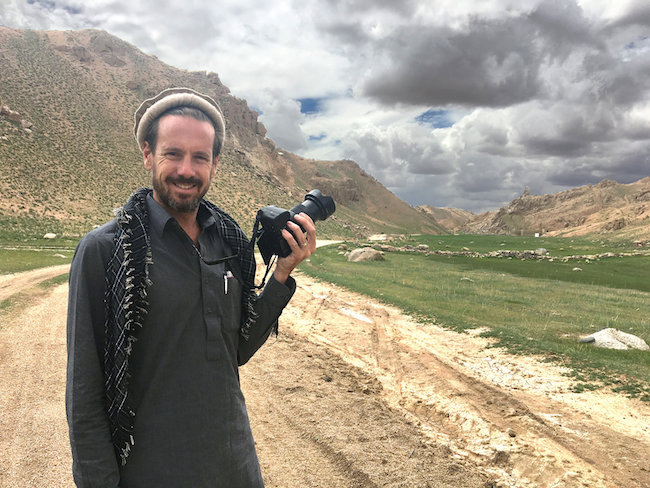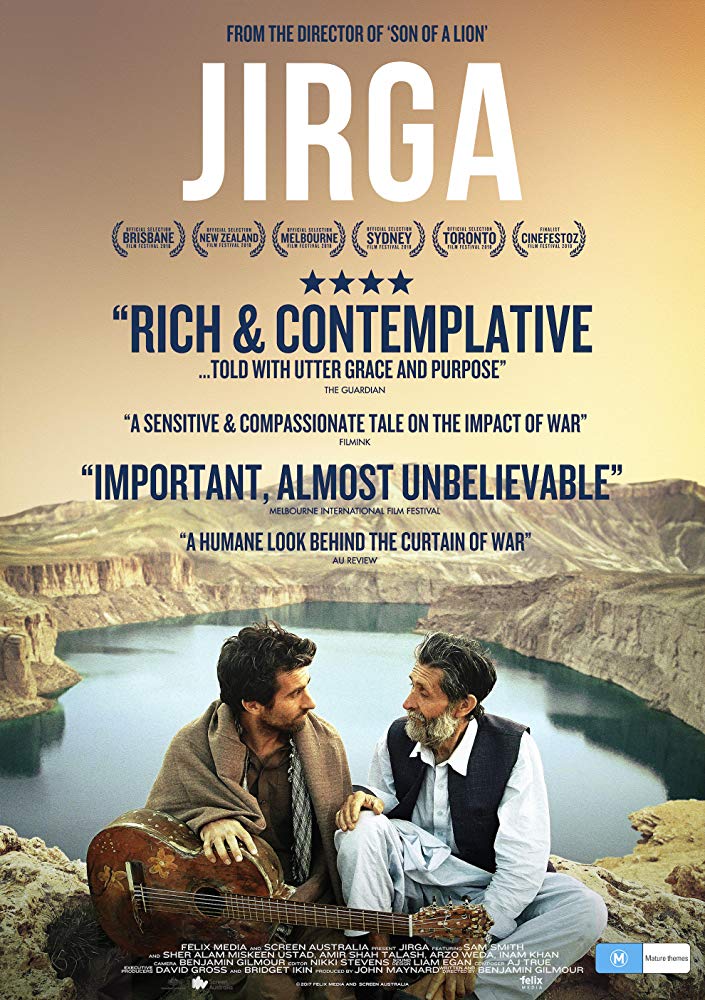


Jirga (Benjamin Gilmour, 2018) wr. Benjamin Gilmour, prod. dist. John Maynard, dp Benjamin Gilmour; Sam Smith; war-related drama, Afghanistan; 78 min.
A former Australian soldier, Mike, returns to Afghanistan to find the family of a civilian he accidentally killed during the war. Seeking forgiveness, he puts his life in the hands of the village justice system – the Jirga.
This is a remarkably simple story, shot under very difficult conditions by the writer/director. I suspect that the shooting ratio was very low, and that almost nothing was left out, as there is just barely enough coverage for the film to make narrative sense. However, it does. It's a wonderful achievement.

Ben Gilmour on location in Afghanistan with the Sony A7s camera on which he shot his feature film.
Luke Buckmaster, in The Guardian, June 2018: "We wait for the first big dramatic moment to kickstart the plot; instead Gilmour persuades us to care less and less about quick hits of gratification, or even standard storytelling techniques. ... You could describe the plot as virtually non-existent, or you could say the story is told with utter grace and purpose.
Both descriptions are accurate. Narrative details certainly aren’t the focus, with so few turning points they are perhaps best left to the film to divulge. Sparse use of subtitles further heightens the realism, while the soundtrack reflects more cinematic inclinations."
Benjamin Gilmour’s Afghanistan-set drama Jirga will carry Australia’s hopes of being nominated for this year’s Best Foreign Language Film Oscar.
The international recognition as Australia’s official submission follows the film’s international premiere at the Toronto International Film Festival and winning the $100,000 best film prize, Australia’s richest, at CinfestOZ.
Produced and distributed by John Maynard, the film stars Sam Smith as a former Australian soldier who returns to Afghanistan seeking forgiveness and puts his life in the hands of the village justice system – the Jirga.

There are 87 countries vying for the prize, including first-time entrants Malawi and Niger and high-profile contenders such as Mexico’s Roma and Poland’s Cold War, both of which are hoping to break out of the foreign race and earn nominations for best picture, best director and more.
Gilmour said: “We are thrilled about the honour of representing Australia. For us it’s the recognition of what Jirga has to say and the fruits of human cross-cultural collaboration. Being selected for the Oscars is also about the company our film is in. I hope Jirga will now reach a much bigger audience.”
Maynard added: “Following the CinefestOZ prize and the international premiere at Toronto I could not be happier to see this film receive this new international honour.”
Brooklyn, NY-based Visit Films is handling foreign sales. Here is a possible omen: The same company represented Bentley Dean and Martin Butler’s Tanna, which was nominated for an Academy Award last year, Australia’s first in that category.
Gilmour’s current project is a book, The Gap, about his “day job” as a paramedic in rural NSW.
Nominations for the 91st Academy Awards will be announced on Tuesday January 22. The Oscars will be held on Sunday February 24 US time.
2019 Foreign Language Film Oscar submissions:
Afghanistan, “Rona Azim’s Mother,” Jamshid Mahmoudi, director
Algeria, “Until the End of Time,” Yasmine Chouikh, director
Argentina, “El Ángel,” Luis Ortega, director
Armenia, “Spitak,” Alexander Kott, director
Australia, “Jirga,” Benjamin Gilmour, director
Austria, “The Waldheim Waltz,” Ruth Beckermann, director
Bangladesh, “No Bed of Roses,” Mostofa Sarwar Farooki, director
Belarus, “Crystal Swan,” Darya Zhuk, director
Belgium, “Girl,” Lukas Dhont, director
Bolivia, “The Goalkeeper,” Rodrigo “Gory” Patiño, director
Bosnia and Herzegovina, “Never Leave Me,” Aida Begić, director
Brazil, “The Great Mystical Circus,” Carlos Diegues, director
Bulgaria, “Omnipresent,” Ilian Djevelekov, director
Cambodia, “Graves without a Name,” Rithy Panh, director
Canada, “Family Ties,” Sophie Dupuis, director
Chile, “…And Suddenly the Dawn,” Silvio Caiozzi, director
China, “Hidden Man,” Jiang Wen, director
Colombia, “Birds of Passage,” Cristina Gallego, Ciro Guerra, directors
Costa Rica, “Medea,” Alexandra Latishev, director
Croatia, “The Eighth Commissioner,” Ivan Salaj, director
Czech Republic, “Winter Flies,” Olmo Omerzu, director
Denmark, “The Guilty,” Gustav Möller, director;
Dominican Republic, “Cocote,” Nelson Carlo De Los Santos Arias, director
Ecuador, “A Son of Man,” Jamaicanoproblem, director
Egypt, “Yomeddine,” A.B. Shawky, director
Estonia, “Take It or Leave It,” Liina Trishkina-Vanhatalo, director
Finland, “Euthanizer,” Teemu Nikki, director
France, “Memoir of War,” Emmanuel Finkiel, director
Georgia, “Namme,” Zaza Khalvashi, director
Germany, “Never Look Away,” Florian Henckel von Donnersmarck, director
Greece, “Polyxeni,” Dora Masklavanou, director
Hong Kong, “Operation Red Sea,” Dante Lam, director
Hungary, “Sunset,” László Nemes, director
Iceland, “Woman at War,” Benedikt Erlingsson, director
India, “Village Rockstars,” Rima Das, director
Indonesia, “Marlina the Murderer in Four Acts,” Mouly Surya, director
Iran, “No Date, No Signature,” Vahid Jalilvand, director
Iraq, “The Journey,” Mohamed Jabarah Al-Daradji, director
Israel, “The Cakemaker,” Ofir Raul Graizer, director
Italy, “Dogman,” Matteo Garrone, director
Japan, “Shoplifters,” Hirokazu Kore-eda, director
Kazakhstan, “Ayka,” Sergey Dvortsevoy, director
Kenya, “Supa Modo,” Likarion Wainaina, director
Kosovo, “The Marriage,” Blerta Zeqiri, director
Latvia, “To Be Continued,” Ivars Seleckis, director
Lebanon, “Capernaum,” Nadine Labaki, director
Lithuania, “Wonderful Losers: A Different World,” Arunas Matelis, director
Luxembourg, “Gutland,” Govinda Van Maele, director
Macedonia, “Secret Ingredient,” Gjorce Stavreski, director
Malawi, “The Road to Sunrise,” Shemu Joyah, director
Mexico, “Roma,” Alfonso Cuarón, director
Montenegro, “Iskra,” Gojko Berkuljan, director
Morocco, “Burnout,” Nour-Eddine Lakhmari, director
Nepal, “Panchayat,” Shivam Adhikari, director
Netherlands, “The Resistance Banker,” Joram Lürsen, director
New Zealand, “Yellow Is Forbidden,” Pietra Brettkelly, director
Niger, “The Wedding Ring,” Rahmatou Keïta, director
Norway, “What Will People Say,” Iram Haq, director
Pakistan, “Cake,” Asim Abbasi, director
Palestine, “Ghost Hunting,” Raed Andoni, director
Panama, “Ruben Blades Is Not My Name,” Abner Benaim, director
Paraguay, “The Heiresses,” Marcelo Martinessi, director
Peru, “Eternity,” Oscar Catacora, director
Philippines, “Signal Rock,” Chito S. Roño, director
Poland, “Cold War,” Pawel Pawlikowski, director
Portugal, “Pilgrimage,” João Botelho, director
Romania, “I Do Not Care If We Go Down in History as Barbarians,” Radu Jude, director
Russia, “Sobibor,” Konstantin Khabensky, director
Serbia, “Offenders,” Dejan Zecevic, director
Singapore, “Buffalo Boys,” Mike Wiluan, director
Slovakia, “The Interpreter,” Martin Šulík, director
Slovenia, “Ivan,” Janez Burger, director
South Africa, “Sew the Winter to My Skin,” Jahmil X.T. Qubeka, director
South Korea, “Burning,” Lee Chang-dong, director
Spain, “Champions,” Javier Fesser, director
Sweden, “Border,” Ali Abbasi, director
Switzerland, “Eldorado,” Markus Imhoof, director
Taiwan, “The Great Buddha+,” Hsin-Yao Huang, director
Thailand, “Malila The Farewell Flower,” Anucha Boonyawatana, director
Tunisia, “Beauty and the Dogs,” Kaouther Ben Hania, director
Turkey, “The Wild Pear Tree,” Nuri Bilge Ceylan, director
Ukraine, “Donbass,” Sergei Loznitsa, director
United Kingdom, “I Am Not a Witch,” Rungano Nyoni, director
Uruguay, “Twelve-Year Night,” Álvaro Brechner, director
Venezuela, “The Family,” Gustavo Rondón Córdova, director
Vietnam, “The Tailor,” Buu Loc Tran, Kay Nguyen, directors
Yemen, “10 Days before the Wedding,” Amr Gamal, director.
Craig Marshall, 'Using a Sony A7S for a feature: What it really takes to get your Indie film into a cinema', redsharknews. [with photos of the production]
Garry Gillard | New: 15 August, 2018 | Now: 4 February, 2020